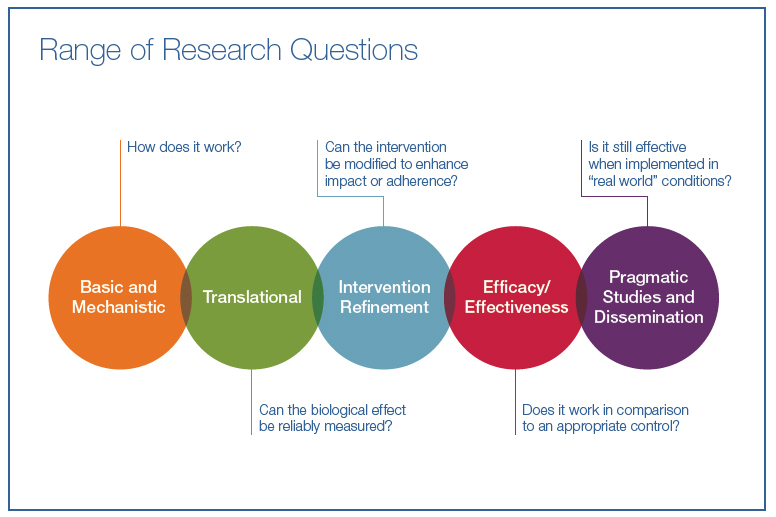Objective 3: Foster Health Promotion and Disease Prevention

Individual behavior plays a key role in health promotion and disease prevention. It is well established that adopting and maintaining healthy behaviors (e.g., good eating habits and regular physical exercise) and modifying unhealthy behaviors (e.g., quitting smoking) reduce risks of major chronic diseases.
Additionally, a small but growing evidence base suggests a potential benefit of complementary health approaches for the purposes of wellness, health promotion, and disease prevention. More research is needed to better understand how certain complementary health approaches can be useful in encouraging better self-care, improving a personal sense of well-being, and promoting a greater commitment to a healthy lifestyle.
The use of complementary health approaches to promote wellness is a relatively new research focus area for NCCIH, but wellness is a familiar concept to many people who use these approaches. In fact, national survey data indicate that more people use complementary approaches to promote health and wellness than to treat a specific illness. In the 2012 NHIS, 94 percent of respondents who practiced yoga and 89 percent of those who used natural product supplements said that they did so for reasons related to wellness; much smaller numbers used these approaches as a treatment. Seventy-two percent of respondents who practiced yoga cited its focus on the whole person—mind, body, and spirit—as one of their reasons for using this practice.
NCCIH is committed to exploring the potential of complementary health approaches to foster health promotion and disease prevention across the lifespan. This includes a focus on methodologically rigorous evaluations that will lead to a greater understanding of whether, when, how, and for whom such practices can have substantial impact, including an understanding of how a formative stage intervention can impact adult health and wellbeing. In addition, the Center is interested in exploring the potential of “omics” technologies to identify optimal health promotion and disease prevention strategies at the individual level.
STRATEGIES
1. Investigate mechanisms of action of complementary and integrative health approaches in health resilience and practices that improve health and prevent disease.

Resilience
The concept of resilience—the capacity to withstand, grow, or recover from change and stress—is important in health, wellness, and prevention research. The study of resilience can help scientists learn why some people are better able than others to resist disease risks posed by stressful or adverse experiences, and it may lead to the development of approaches that will help individuals adapt in a more positive manner to negative life events.
NCCIH seeks to support research on complementary health approaches and resilience across the continuum from basic and mechanistic studies through clinical trials that examine the efficacy and effectiveness of interventions. NCCIH is interested in understanding the mechanisms of action and potential effects of complementary health approaches in the context of resilience. These efforts will build upon extant data involving mind and body practices such as mindfulness-based stress reduction or meditation. Future studies will help determine the value of complementary health approaches in enhancing cognitive, emotional, and behavioral resilience in people who are subjected to stressful or adverse circumstances. NCCIH also is interested in the role that some natural products may play in increasing resilience to psychological stressors. In addition, substances from some natural products may promote metabolic resilience—that is, the ability to maintain health despite the presence of stressors such as a high-fat diet or inflammation. Similarly, the potential role of the microbiome in the development and maintenance of resilience is of interest to NCCIH.
Promoting Health and Preventing Disease
NCCIH’s research investments in understanding the role of complementary and integrative approaches in promoting health and preventing disease are, in part, informed by data on the complementary products and practices people use. These data include what groups of people use them, why they use them, how their use has changed over time, and how their use relates to health outcomes.
Survey data have revealed that people who use complementary approaches for wellness differ in significant ways from those who use them to treat an illness. For example, an analysis of NHIS data showed that wellness-oriented users of complementary approaches were generally healthier, had a lower rate of use of conventional health services, and had healthier behaviors overall, including greater physical activity and a lower likelihood of obesity, than those who used complementary approaches to treat illnesses.
Surveys are only a first step in gaining knowledge about health-related behavior. More focused research is needed to understand why people make healthy, unhealthy, or risky choices; find out what choices people are making on a day-to-day basis; and elucidate the impact these choices may have on short- and long-term health. Ever-changing technologies have improved the ways in which data can be obtained on a variety of behaviors. For example, wearable devices can monitor physical activity and physiologic measures such as heart rate. Current studies can also harness state-of-the art technologies and approaches from the neurobiological, biomechanical, and biological sciences to elucidate biological effects and identify mechanisms of action of behaviors and interventions of interest. Researchers conducting studies may leverage existing databases such as electronic health records to provide real world insights into health and health care.
2. Study complementary health approaches to promote health and wellness across the lifespan in diverse populations.
NCCIH seeks to foster research to develop, test, and refine interventions and to find ways to adapt interventions to meet the needs of different populations, including those most vulnerable (e.g., disadvantaged children and youth—by virtue of poverty or other adversities, racial and ethnic minority populations). The Center plans to foster research that examines the potential contributions of complementary approaches in promoting healthy behaviors and preventing diseases and disorders across the life course with a strong focus on developmental stage. Most use of complementary health approaches in the United States is aimed at improving general health and well-being, but most complementary health research to date has focused on the application of those approaches to specific conditions or symptoms. Although the scientific and operational challenges in pursuing a health-promotion research agenda are significant, compelling opportunities exist to explore the potential role of complementary and integrative interventions for health promotion and prevention.
For example, preliminary evidence suggests that nurturing mindfulness in children and youth may be a feasible and effective universal intervention for building resilience. However, the evidence base is quite small. Larger, more rigorous studies are needed to determine the efficacy of these interventions, and if they are efficacious, further research will be needed to determine who benefits and at what age, and to identify the mechanisms of action and how the interventions can be implemented with fidelity at scale by trained providers. Another example of health promotion and prevention research is examining the potential of mindfulness approaches to reduce stress, anxiety, and depression in pregnant women and improve birth outcomes. In addition, there is a need for interventions that focus on strengthening emotional regulation and reducing stress to promote healthy behaviors and prevent disease in vulnerable populations.
NCCIH and the Health Care Systems Research Collaboratory
In 2012, NCCIH took the lead on an NIH Common Fund initiative, the Health Care Systems Research Collaboratory. This program engages health care delivery organizations as research partners, with the goal of building methods to conduct rigorous large-scale clinical trials in real world settings. Through the Collaboratory, NIH is pioneering the development of approaches to conduct large-scale, cost-effective clinical studies where patients already receive care.
Two of the Collaboratory’s pragmatic clinical trials—the Lumbar Imaging with Reporting of Epidemiology (LIRE) study and the Collaborative Care for Chronic Pain in Primary Care (PPACT) study—are addressing pain management. The LIRE study, a partnership with the National Institute of Arthritis and Musculoskeletal and Skin Diseases and a number of health maintenance organizations, is looking at the impact of more detailed radiology reports for back pain imaging studies on subsequent use of resources. PPACT, which involves a number of Kaiser health systems, with oversight from the National Institute on Drug Abuse and the National Institute of Neurological Disorders and Stroke, will examine the impact of an integrated pain management strategy implemented in primary care practices.
These trials address questions of major public health importance and engage health care delivery systems in research partnerships, helping to establish best practices and provide proof of concept for innovative designs in pragmatic clinical research
3. Explore research opportunities to study and assess the safety and efficacy of complementary health approaches in nonclinical settings such as community- and employer-based wellness programs.
Employer- and community-based health and wellness programs are widespread, even though little is known about their effectiveness. Some offer healthy lifestyle promotion, while others focus on disease management. An increasing number of these programs incorporate complementary health approaches, but very few studies have evaluated the potential benefit of complementary approaches in these settings.
NCCIH is interested in developing research partnerships and priorities to assess the safety and efficacy of complementary health approaches in workplace and community settings, with an emphasis on programs in medically underserved communities. NCCIH’s experience with the Health Care Systems Research Collaboratory has demonstrated the feasibility of public-private partnerships. NCCIH will draw on this experience to build partnerships with employers or community health centers to expand and prioritize research on the effectiveness of wellness programs.
Leveraging the existing investments of employers and communities in these programs may facilitate comparative effectiveness trials of wellness programs with and without complementary or integrative components. Such trials could answer important research questions. For example, trials could be designed to find out whether workplace-based mindfulness training decreases stress and improves workplace satisfaction and productivity or whether workplace yoga classes enhance the effectiveness of conventional weight management programs.
This is a relatively new area of research for NCCIH, so it is important to investigate feasibility and identify infrastructure needs before attempting large-scale trials. Data need to be collected on the types of complementary approaches that are most commonly included in employer- and community-based wellness programs, the reasons why these approaches are chosen, the demographics of individuals engaged in the programs, the ways in which programs are marketed to potential participants, and the outcomes of greatest interest to employers and community organizations. In addition, there will need to be an assessment of various trial methodologies and evaluation criteria that could be used in clinical studies in “real world” settings and diverse populations.